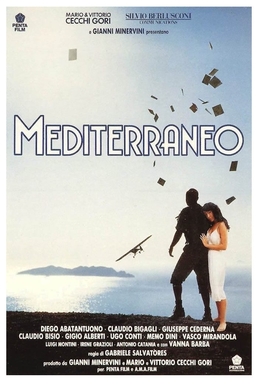
No Man's Land is a 2001 war film that is set in the midst of the Bosnian War. The film is a parable and marks the debut of Bosnian writer and director Danis Tanović. It is a co-production among companies in Bosnia and Herzegovina, Slovenia, Italy, France, Belgium, and the United Kingdom. The film first premiered on 19 September 2001 in France. It later won an Oscar for Best Foreign Language Film in 2002.

Amarcord is a 1973 comedy-drama film directed by Federico Fellini, a semi-autobiographical tale about Titta, an adolescent boy growing up among an eccentric cast of characters in the village of Borgo San Giuliano in 1930s Fascist Italy. The film's title is a univerbation of the Romagnol phrase a m'arcôrd. The title then became a neologism of the Italian language, with the meaning of "nostalgic revocation". The central role of Titta is based on Fellini's childhood friend from Rimini, Luigi Titta Benzi. Benzi became a lawyer and remained in close contact with Fellini throughout his life.
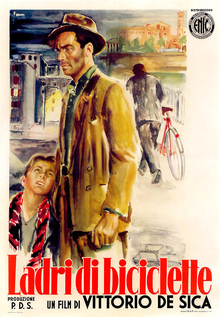
Bicycle Thieves, also known as The Bicycle Thief, is a 1948 Italian neorealist drama film directed by Vittorio De Sica. It follows the story of a poor father searching in post-World War II Rome for his stolen bicycle, without which he will lose the job which was to be the salvation of his young family.

Cinema Paradiso is a 1988 coming-of-age dramedy film written and directed by Giuseppe Tornatore.

Italian war crimes have mainly been associated with Fascist Italy in the Pacification of Libya, the Second Italo-Ethiopian War, the Spanish Civil War, and World War II.

Nights of Cabiria is a 1957 drama film co-written and directed by Federico Fellini. It stars Giulietta Masina as Cabiria, a prostitute living in Rome. The cast also features François Périer and Amedeo Nazzari. The film is based on a story by Fellini, who expanded it into a screenplay along with his co-writers Ennio Flaiano, Tullio Pinelli and Pier Paolo Pasolini.

Cyrano de Bergerac is a 1990 French period comedy-drama film directed by Jean-Paul Rappeneau and based on the 1897 play of the same name by Edmond Rostand, adapted by Jean-Claude Carrière and Rappeneau. It stars Gérard Depardieu, Anne Brochet and Vincent Perez. The film was a co-production between companies in France and Hungary.
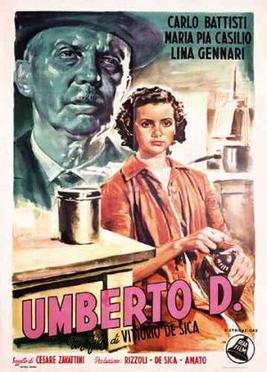
Umberto D. is a 1952 Italian neorealist film directed by Vittorio De Sica. Most of the actors were non-professional, including Carlo Battisti who plays the title role of Umberto Domenico Ferrari, a poor elderly man in Rome who is desperately trying to keep his rented room. His landlady is evicting him and his only true friends, the housemaid and his dog Flike are of no help.
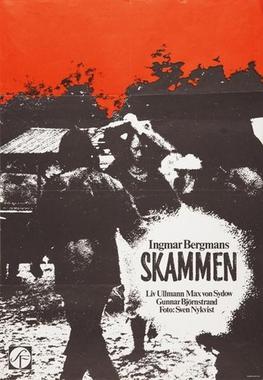
Shame is a 1968 Swedish drama film written and directed by Ingmar Bergman, and starring Liv Ullmann and Max von Sydow. Ullmann and von Sydow play Eva and Jan, former violinists, a politically uninvolved couple whose home comes under threat by civil war. They are accused by one side of sympathy for the enemy, and their marriage deteriorates while the couple flees. The story explores themes of shame, moral decline, self-loathing and violence.

House of Fools is a 2002 Russian film by Andrei Konchalovsky about psychiatric patients and combatants during the First Chechen War. It stars Julia Vysotskaya and Sultan Islamov and features a number of cameo appearances by Bryan Adams, with the music composed by Eduard Artemyev.
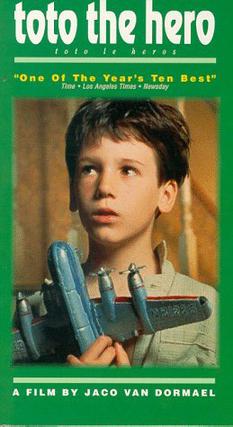
Toto the Hero is a 1991 Belgian film by Belgian film director and screenwriter Jaco Van Dormael. It won the Caméra d'Or award at the Cannes Film Festival in 1991, and the César Award for Best Foreign Film in 1992. The film was selected as the Belgian entry for the Best Foreign Language Film at the 64th Academy Awards, but was not accepted as a nominee.

The Great War is a 1959 Italian comedy-drama war film directed by Mario Monicelli. It tells the story of an odd couple of army buddies in World War I; the movie, while played on a comedic register, does not hide from the viewer the horrors and grimness of trench warfare. Starring Alberto Sordi and Vittorio Gassman and produced by Dino De Laurentiis, the film won the Golden Lion at the Venice Film Festival. Its crew also included Danilo Donati (costumes) and Mario Garbuglia.
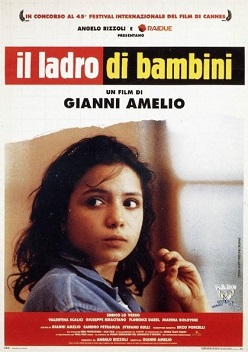
The Stolen Children is a 1992 Italian film directed by Gianni Amelio. The film was selected as the Italian entry for the Best Foreign Language Film at the 65th Academy Awards, but was not accepted as a nominee.

Franco Interlenghi was an Italian actor.

Italian irredentism in Corsica was a cultural and historical movement promoted by Italians and by people from Corsica who identified themselves as part of Italy rather than France, and promoted the Italian annexation of the island.
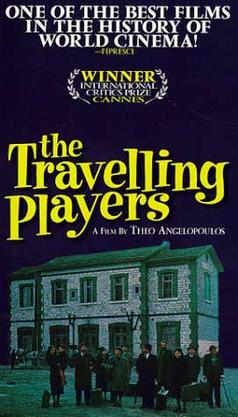
The Travelling Players is a 1975 Greek historical drama film written and directed by Theodoros Angelopoulos that traces the history of mid-20th-century Greece from 1939 to 1952.

Riccardo Cucciolla was an Italian actor and voice actor. He appeared in 60 films between 1953 and 1999. He won the Best Actor Award at the 1971 Cannes Film Festival for the film Sacco & Vanzetti.
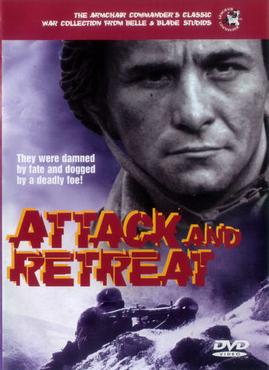
Attack and Retreat is a Soviet-Italian war drama film directed by Giuseppe De Santis and Dmitri Vasilyev in 1964. The movie follows the steps of Italian soldiers of the Italian Army in Russia fighting on the Eastern Front on Hitler's side. Heavily based on diaries and memories of real war veterans.

"Italians, the good people" is a phrase adopted by historians to refer to Italian popular beliefs about the allegedly limited, even non-existent, participation of Fascist Italy and the Royal Italian Army in the Holocaust and war crimes committed by Axis soldiers during World War II. The phenomenon is also known as the myth of the good Italian.
